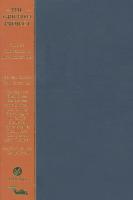The Griffith Project Volume 2: Films Produced in January–June 1909 9780851707488, 9781838710750, 9781839020063
Silent film director D.W. Griffith is the subject of this study. Only a small group of his more than 500 films are subje
185 53 21MB
English Pages [210] Year 1999
Cover
Half-title
Dedication
Title
Copyright
Contents
Foreword
Notes on Contributors
Note on Layout
91. Love Finds a Way
92. Those Boys!
93. The Fascinating Mrs. Francis
94. Those Awful Hats
95. Tragic Love
96. The Cord of Life
97. The Girls and Daddy
98. The Brahma Diamond
99. Politician's Love Story
100. Jones and the Lady Book Agent
101. His Wife's Mother
102. The Golden Louis
103. His Ward's Love
104. The Prussian Spy
105. The Deception
106. At the Altar
107. Lady Helen's Escapade
108. A Fool's Revenge
109.1 Did It, Mamma
110. The Medicine Bottle
111. The Salvation Army Lass
112. The Lure of the Gown
113. The Wooden Leg
114. The Voice of the Violin
115. "And a Little Child Shall Lead Them"
116. Jones and His New Neighbors
117. Trying to Get Arrested
118. A Drunkard's Reformation
119. The Winning Coat
120. A Rude Hostess
121. A Burglar's Mistake
122. The Road to the Heart
123. The Eavesdropper
124. Schneider's Anti-Noise Crusade
125. The French Duel
126. Twin Brothers
127. The Note in the Shoe
128. Lucky Jim
129. A Sound Sleeper
130. A Troublesome Satchel
131. Confidence
132. The Suicide Club
133. The Drive for a Life
134. One Busy Hour
135. Tis an ILL Wind That Blows No Good
136. A Baby s Shoe
137. The Jilt
138. Her First Biscuits
139. Eloping with Aunty
140. Resurrection
141. The Violin Maker of Cremona
142. The Cricket on the Hearth
143. Eradicating Aunty
144. What Drink Did
145. Two Memories
146. The Peachbasket Hat
147. The Son's Return
148. A New Trick
149. His Duty
150. The Lonely Villa
151. The Faded Lillies
152. The Friend of the Family
153. The Way of Man
154. Was Justice Served?
155. The Necklace
156. The Mexican Sweethearts
157. The Message
158. The Country Doctor
159. The Seventh Day
160. The Cardinal's Conspiracy
161. Jealousy and the Man
162. Tender Hearts
163. A Convict's Sacrifice
164. A Strange Meeting
165. Mrs. Jones' Lover; or, "I Want My Hat"
166. The Renunciation
167. Sweet and Twenty
168. The Slave
Bibliography
Index of Titles: January-June 1909
Cumulative Index of Titles: 1907-June 1909
Recommend Papers

- Author / Uploaded
- Paolo Cherchi Usai (editor)
File loading please wait...
Citation preview
--—- . ^ „-,„-. ^ ^ ^ ^ • • • ' '
f i i
•
•
•
..•''
••:.--/
« ^ »
UfeKk-jJNE ^90?
T-*. ,L
*
,—T
fcwi.-*-
f
•S.l'f-ifi'Vn V F
• in
7*
«
Wu.'i-
CQNISIBUTORS
Sec"'" Slsssscs - f . .
.
=—
SISTANT EUITQS
C
.*> B ~-~- - - ^ j -
TC v r*r.w?«
:'. P
;.< ; ' 1;
; 1
I
1
THE GRIFFITH PROJECT VOLUME 2 FILMS PRODUCED IN JANUARY-JUNE
1909
THE GRIFFITH PROJECT VOLUME 2 FILMS PRODUCED IN JANUARY-JUNE
1909
To DAVIDE TURCONI, FIRST MENTOR OF THE GLORNATE
THE GRIFFITH PROJECT VOLUME 2
Films Produced in January-June 1909
GENERAL EDITOR
Paolo Cherchi Usai
CONTRIBUTORS
Eileen Bowser, Ben Brewster, Tom Gunning, Steven Higgins, Richard Koszarski, David Mayer, Russell Merritt, Scott Simmon, Kristin Thompson ASSISTANT EDITOR
Cynthia Rowell
LEGHH1NATE DEI. CINEMA
A BFI book published by Paigrave MacmiUan
First published in 1999 by the British Film Institute 21 Stephen St, London W1P 2LN The British Film Institute is the UK national agency with responsibility for encouraging the arts of film and television and conserving them in the national interest. Copyright © Le Giornate del Cinema Muto 1999 Set in Italian Garamond by Ketchup, London British Library Cataloguing-in-Publication Data A catalogue record for this book is available from the British Library
ISBN 978-0-85170-748-8 eISBN 978-1-83902-005-6 ISBN 978-1-83902-006-3
CONTENTS
Foreword Notes on Contributors Note on Layout 91. Love Finds a Way 92. Those Boys! 93. The Fascinating Mrs. Francis 94. Those Awful Hats 95. Tragic Love 96. The Cord of Life 97. The Girls and Daddy 98. The Brahma Diamond 99. Politician's Love Story 100. Jones and the Lady Book Agent 101. His Wife's Mother 102. The Golden Louis 103. His Ward's Love 104. The Prussian Spy 105. The Deception 106. At the Altar 107. Lady Helen's Escapade 108. A Fool's Revenge 109.1 Did It, Mamma 110. The Medicine Bottle 111. The Salvation Army Lass 112. The Lure of the Gown 113, The Wooden Leg 114. The Voice of the Violin 115. "And a Little Child Shall Lead Them" 116. Jones and His New Neighbors 117. Trying to Get Arrested 118. A Drunkard's Reformation 119. The Winning Coat 120. A Rude Hostess
121. A Burglar's Mistake 122. The Road to the Heart 123. The Eavesdropper 124. Schneider's Anti-Noise Crusade 125. The French Duel 126. Twin Brothers 127. The Note in the Shoe 128. Lucky Jim 129. A Sound Sleeper 130. A Troublesome Satchel 131. Confidence 132. The Suicide Club 133. The Drive for a Life 134. One Busy Hour 135. Tis an 111 Wind That Blows No Good 136. A Baby's Shoe 137. The Jilt 138. Her First Biscuits 139. Eloping with Aunty 140. Resurrection 141. The Violin Maker of Cremonst 142. The Cricket on the Hearth 143. Eradicating Aunty 144. What Drink Did 145. Two Memories 146. The Peachbasket Hat 147. The Son's Return 148. A New Trick 149. His Duty 150. The Lonely Villa 151. The Faded Lillies 152. The Friend of the Family 153. The Way of Man 154. Was Justice Served? 155. The Necklace
vii viii x 1 3 5 7 9 11 13 15 18 20 22 24 26 28 30 32 34 36 39 41 43 45 47 49 51 53 55 51 61 63 V
65 67 69 71 73 75 77 80 83 85 87 90 92 96 98 102 107 110 112 114 117 119 122 124 127 129 131 135 137 139 145 147 149 152 155
156. The Mexican Sweethearts 157. The Message 158. The Country Doctor 159. The Seventh Day 160. The Cardinal's Conspiracy 161. Jealousy and the Man 162. Tender Hearts 163. A Convict's Sacrifice 164. A Strange Meeting 165. Mrs. Jones' Lover; or, "I Want My Hat"
157 159 162 167 169 172 174 176 179 182
166. The Renunciation 167. Sweet and Twenty 168. The Slave
184 187 189
Bibliography Index of Titles: January-June 1909 Cumulative Index of Titles: 1907-June 1909
192 193 195
FOREWORD
This is the second installment of a multi-year research project commissioned by the Pordenone Silent Film Festival, involving the analysis of all the films where D.W. Griffith was credited as director, writer, producer and supervisor. As in the case of Volume 1 (1907-1908), contributors to The Griffith Project were asked to analyze groups of consecutive films, listed here in their shooting order. Please note that it is the last day of shooting that deterrnines the chronology and perimeter of each volume. Every entry is preceded by a plot synopsis taken from the actual viewing of the print, and by summaries or reviews published at the time of release. The primary source for filmographic information on the Biograph period is D. W. Griffith and the Biograph Company (Cooper C. Graham, Steven Higgins, Elaine Mancini, Joao Luiz Vieira. Metuchen, N J., and London: The Scarecrow Press, 1985), by far the best factual source on the subject. We gratefully acknowledge its authors and publisher, with special thanks to Steven Higgins - a longtime friend of the Pordenone Silent Film Festival - who patiently revised the text and provided invaluable advice on various aspects of the overall project. Various contributors to The Griffith Project have added or amended information contained in the Scarecrow filmography, or submitted additional notes after the pre-publication of Volumes 1 and 2, presented at Pordenone in 1997 and 1998 in the form of program notes. The Griffith Project would not exist without the generous help of all the individuals and institutions involved in the preservation of Griffith's work. Our special thanks go to Mary Lea Bandy, Anne Morra and Steven Higgins (The Museum of Modern Art, New York), David Francis, Patrick Loughney, Madeline Matz and Mike Mashon (Library of Congress), who are currently in charge of this massive undertaking, initiated several years ago by Iris Barry and Eileen Bowser at MoMA and by the staff of the Motion Picture, Broadcasting, and Recorded Sound Division at the Library of Congress. The Board of Directors of the Pordenone Silent Film Festival (Davide Turconi, David Robinson, Piera Patat, Livio Jacob, Lorenzo CodelH, Carlo Montanaro, Piero Colussi and Andrea Crozzoli) was instrumental in turning the Griffith retrospective into a unique opportunity to reassess the extraordinary contribution of D.W. Griffith to the art of film. A condensed version of the debate within the Pordenone team before the project started in October 1997 can be found in Griffithiana y Vol. XXI, 62-63, May 1998: 4-37. We are also grateful for the invaluable assistance of Edward E. Stratmann and Philip C. Carli of George Eastman House, as well as Greg Linnell, 1999 graduate of the L. Jeffrey Selznick School of Film Preservation at George Eastman House. Finally, we wish to extend our thanks to Simona Monizza, 1998 graduate of the L. Jeffrey Selznick School of Film Preservation, for her precious help in collecting and processing information for this volume at the early stage of the project. Paolo Cherchi Usai Rochester, April 1999
vii
NOTES ON CONTRIBUTORS
EILEEN BOWSER is a film historian and curator emeritus of the film archives, Department of Film and Video, The Museum of Modern Art, New York. She is cataloguer of the D.W. Griffith collection of papers at the museum, author of The Transformation of Cinema: 1907-1915, co-author (with Iris Barry) olD.W. Griffith (1965) and editor of Biograph Bulletins 1908-1912 (1973). BEN BREWSTER is the assistant director of the Wisconsin Center for Film and Theater Research in Madison, Wisconsin, USA. He is co-author (with Lea Jacobs) of Theatre to Cinema: Stage Pictorialism and the Early Feature Film and author of many articles on early cinema in Screen, Film History, Cinema Journal, and Griffithiana, PAOLO CHERCHL USAI, senior curator of the Motion Picture Department at George Eastman House, is associate professor of Film at the University of Rochester and director of the L. Jeffrey Selznick School of Film Preservation, established in 1996. Co-founder of the Pordenone Silent Film Festival and Domitor (Society for Early Cinema Studies), he is an adjunct member of the National Film Preservation Board at the Library of Congress, and a member of the Executive Committee of the International Federation of Film Archives (FIAF). A revised and expanded version of his book Burning Passions: An Introduction to the Study of Silent Cinema (1994) is forthcoming from BFI Publishing. TOM G U N N I N G is professor of Art History and member of the Committee on Cinema and Media at the University of Chicago. He is the author of D. W. Griffith and the Origins of American Narrative Film: The Early Years at Biograph (1991) and numerous articles on early cinema (including "the Cinema of Attractions"). He was a founding member of Domitor, the international society for the study of early film. His book on the films of Frit2 Lang is forthcoming from BFI Publishing. STEVEN HIGGINS is curator in the Department of Film and Video, Museum of Modern Art, New York. RICHARD KOSZARSKI is editor-in-chief oiFilm History: An International journal. His books include The Man You Loved to Hate: Erich von Stroheim and Hollywood (1983), and An Evenings Entertainment: The Age of the Silent Feature Picture (1990). He was the 1991 recipient of the Prix Jean Mitry from the Pordenone Silent Film Festival. Previously head of collections and exhibitions for the American Museum of the Moving Image, he now teaches film history at Rutgers University. DAVID MAYER is emeritus professor of Drama and research professor at the University of Manchester, England. His books include Harlequin in His Element: English Pantomime, 1806-1836 (1969) and Playing Out the Empire: Ben Hur and Other Toga Plays and Films (1994). He is the author of numerous essays on nineteenth and early twentieth-century popular stage entertainments and links with early film. RUSSELL MERRTTT teaches at the University of California at Berkeley and has written, with J.B. Kaufman, an account of Walt Disney's silent cartoons, Walt in Wonderland: The Silent Films of Walt Disney (1992).
viii
THE GRIFFITH PROJECT: VOLUME 2
CYNTHIA ROWELL graduated in 1999 from the L. Jeffrey Sehnick School of Film Preservation at George Eastman House. She is director of Acquisitions and International Sales for Milestone Film and Video. SCOTT SIMMON is author of The Films of D.W. Griffith (1993) and other volumes on American film and film preservation. For the Library of Congress, he has overseen restorations of Oscar Micheaux's Within Our Gates (1919) and Lois Weber's Where Are My Children? (1916). He is producer of The Library of Congress Video Collection and, for the National Film Preservation Foundation, Treasures of American Film Archives, a video set of rare films from seventeen U.S. archives. Currently he is visiting associate professor at the University of California, Davis, and is completing a book on the Western. KRISTIN T H O M P S O N is an honorary fellow in the Communication Arts Department at the University of Wisconsin-Madison. Her books include The Classical Hollywood Cinema (1985), cowritten with David Bordwell and Janet Staiger, and Exporting Entertainment: America in World Film Markets 1901-1934 (1985). She has a forthcoming book, Storytelling in the New Hollywood (1999), and is at work on a study comparing Ernst Lubitsch's silent German and American features.
IX
NOTE ON LAYOUT
[
tJja^IRSTAIWE^fKiRE if>w'yr% Uets. V M«tH IK 1 *
Filmographic information
""^
\^ \
^
i
1 !t*tii«i««
I
[ *t^ L^"^
\ \
/
Vanctvt: Wallace MrCmthevn, >(. A*/*w- nunc trtwmi
Program sequence number, production company
Bk»*HPH
" ^
/
;
B K M , unffiib? !/»itw); Rjptfei if«!t«. a* M ^ I
!
AWraSMiMu^t T ^ i l » * s £ T o t Modem An. »mm









